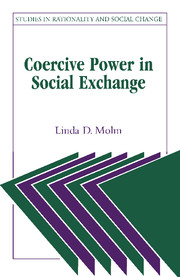Book contents
- Frontmatter
- Contents
- LIST OF FIGURES AND TABLES
- PREFACE AND ACKNOWLEDGMENTS
- 1 Introduction and overview
- 2 Social exchange and power
- 3 Punishment and coercion
- 4 An experimental setting for studying power in exchange relations
- 5 The early research: experimental tests and theoretical puzzles
- 6 The structural determination of power use
- 7 Dependence and risk: structural constraints on strategic power use
- 8 Injustice and risk: normative constraints on strategic power use
- 9 The effects of coercion: compliance or conflict?
- 10 A theory of coercion in social exchange
- 11 Conclusions and implications
- APPENDIX I Definitions of basic concepts of social exchange
- APPENDIX II The experimental instructions for the standardized setting
- REFERENCES
- NAME INDEX
- SUBJECT INDEX
PREFACE AND ACKNOWLEDGMENTS
Published online by Cambridge University Press: 06 July 2010
- Frontmatter
- Contents
- LIST OF FIGURES AND TABLES
- PREFACE AND ACKNOWLEDGMENTS
- 1 Introduction and overview
- 2 Social exchange and power
- 3 Punishment and coercion
- 4 An experimental setting for studying power in exchange relations
- 5 The early research: experimental tests and theoretical puzzles
- 6 The structural determination of power use
- 7 Dependence and risk: structural constraints on strategic power use
- 8 Injustice and risk: normative constraints on strategic power use
- 9 The effects of coercion: compliance or conflict?
- 10 A theory of coercion in social exchange
- 11 Conclusions and implications
- APPENDIX I Definitions of basic concepts of social exchange
- APPENDIX II The experimental instructions for the standardized setting
- REFERENCES
- NAME INDEX
- SUBJECT INDEX
Summary
The product of nearly a decade of theoretical and empirical work on power in social exchange networks, this book describes the progression of a theoretically driven, cumulative program of experimental research, begun at Emory University in the mid-1980s and completed at the University of Arizona. During that 10-year period, many of the results of the individual experiments in the program were published in journals, the typical outlet for experimental research.
As the program progressed and both empirical findings and theoretical knowledge began to cumulate, however, I became more and more frustrated with the impossibility of conveying the substance of the whole in a series of pieces, each of which had to stand more or less on its own. The logic and significance of each successive experiment depended substantially on what had gone before and, as that earlier body of work became larger and larger, the journal format could no longer accommodate what I wanted to say. This book has given me that opportunity.
In writing this book, I had two different, but related, objectives. One was to compare reward-based and coercive forms of power in social exchange relations: how they are different, why they are different, and the implications of those differences for both theory and social relationships. The results of this analysis offer important insights and challenges for both social exchange theory (which traditionally has ignored the role of punishment and coercion in social relationships) and theories of coercive power (which traditionally have ignored the capacities of actors, in most relations, to reward as well as to punish each other).
- Type
- Chapter
- Information
- Coercive Power in Social Exchange , pp. ix - xiiPublisher: Cambridge University PressPrint publication year: 1997



